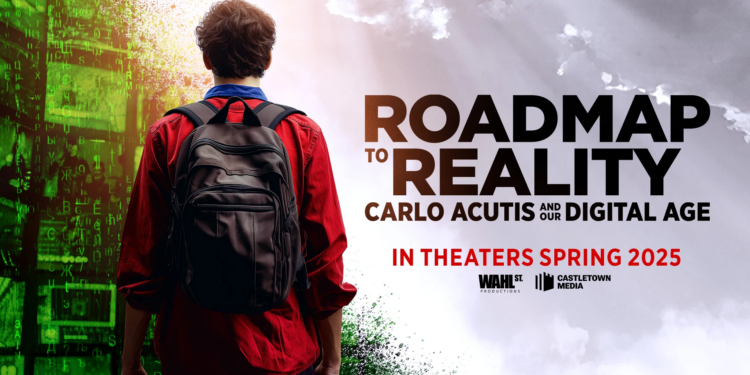CNA Staff, Dec 19, 2024 / 10:55 am
An online presentation Tuesday sponsored by the National Eucharistic Revival explored the question of how Catholics can use technology for good, inspired by the life of soon-to-be-saint Carlo Acutis.
Acutis, a young Italian who died in 2006, is due to be canonized during the Catholic Church’s 2025 Jubilee Year. He is known for his skillful use of technology to spread his Catholic faith, particularly his creation of a still-extant website cataloging Eucharistic miracles.
Born in 1991, Carlo’s mother remembers the young whiz kid proudly describing himself as a “computer scientist” well before he got his first computer as a gift around the year 2000. He is often described as the Catholic Church’s first “tech-savvy” saint.
Tim Moriarty, director of the new film “Roadmap to Reality: Carlo Acutis and Our Digital Age” and co-host of the Dec. 17 webinar, highlighted statistics that suggest the average teen spends half of his or her waking hours looking at screens, and the troubling evidence of mental health issues and suicidal ideation linked to excessive digital engagement.
He described Acutis as a “digital missionary” who masterfully used the internet as a tool in his pursuit of holiness while the Eucharist kept him anchored to reality — unlike so many of his peers who, Moriarty argued, fell into the distractions, vices, and prideful pursuits that the burgeoning internet had to offer.
In the face of such challenges posed by imprudent use of technology, “in a world losing itself to screens,” Moriarty called Acutis “absolutely a saint for our times … the saint we need.”
Acutis’ deep devotion to Christ in the Eucharist, which informed his prudent use of technology, is an example for people today, he said.
“[Acutis was] online to get people offline,” Moriarty said, explaining that Acutis sought to encourage people to have a tangible encounter with God in the sacraments, as Acutis himself so often did in Eucharistic adoration and at Mass.
Brett Robinson, associate professor of practice at Notre Dame’s McGrath Institute and the co-host of the webinar, called for a critical examination of Catholics’ relationship with technology, urging them to try to use technology intentionally and focus on cultivating meaningful relationships outside of the digital sphere.
He asserted that Catholics would do well to take an approach to technology more like the Amish — a group that contrary to popular belief does not reject technology, he added — and ask in the face of technological advancements not “What can this do for me?” but rather “What will this do for my community?”
Because society has become so dependent on technology, many people believe there is no choice but to accept the “collateral damage” of a teen mental health crisis driven largely by social media, the scourge of pornography, and a decay of public discourse online, Robinson argued.
An “atomized” approach to life and a lack of “formation” in virtue has led to the misuse of technology and many of the problems of modern society, he asserted.
Robinson similarly presented Acutis as a model for navigating this digital landscape, emphasizing a balance between embracing technology’s benefits and maintaining a grounded spirituality — particularly within devotion to the Eucharist — as well as human connection.
Robinson closed by offering several pieces of advice for a better relationship with technology that he compiled from his students at Notre Dame; slow down and take moments of rest, reflection, and silence; go outside and spend time in nature to escape digital noise and find peace; be present and prioritize human connection, rituals, and habits; set boundaries and use technology intentionally; and seek meaning, defining yourself by your values and passions rather than your achievements.
Above all, he said, Christians are called to “contextualize” the world, helping those they encounter to understand the bigger picture.
(Story continues below)
Subscribe to our daily newsletter
“Something is being revealed in all this [technological] change; something’s being revealed about what it means to be human. And that’s actually a really good thing for the Church, but it’s up for us to discern,” Robinson said.
Credit: Source link





